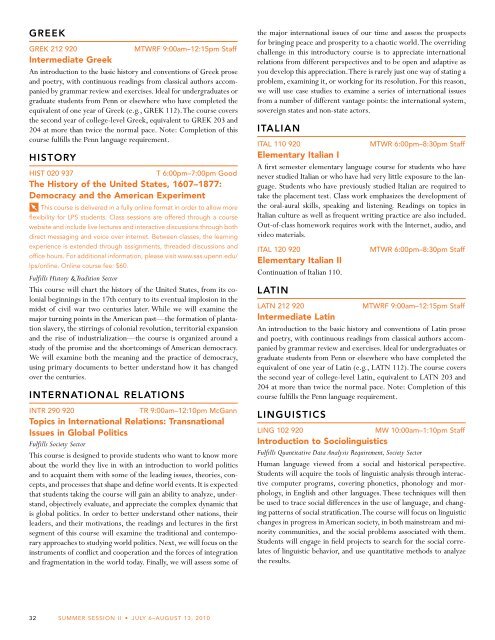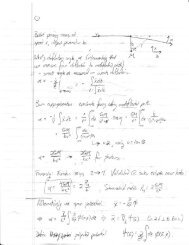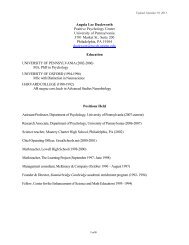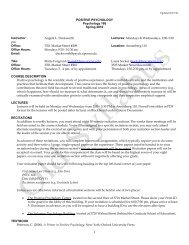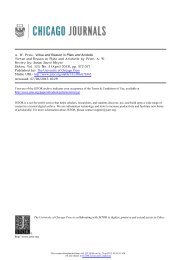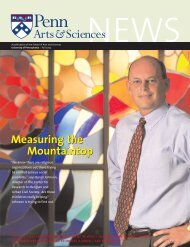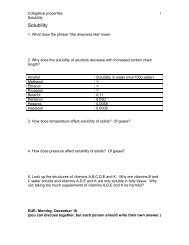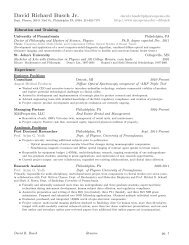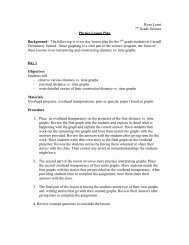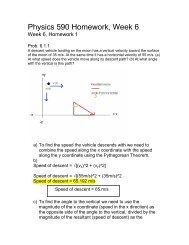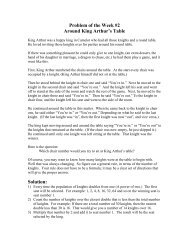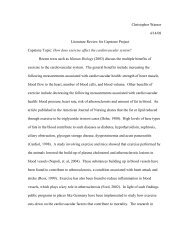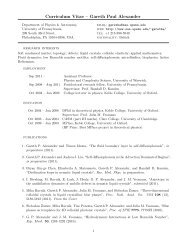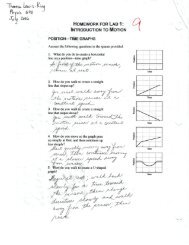PENN SUMMER - University of Pennsylvania
PENN SUMMER - University of Pennsylvania
PENN SUMMER - University of Pennsylvania
You also want an ePaper? Increase the reach of your titles
YUMPU automatically turns print PDFs into web optimized ePapers that Google loves.
GreeK<br />
greK 212 920 MTWrF 9:00am–12:15pm staff<br />
Intermediate Greek<br />
An introduction to the basic history and conventions <strong>of</strong> Greek prose<br />
and poetry, with continuous readings from classical authors accompanied<br />
by grammar review and exercises. Ideal for undergraduates or<br />
graduate students from Penn or elsewhere who have completed the<br />
equivalent <strong>of</strong> one year <strong>of</strong> Greek (e.g., GREK 112).The course covers<br />
the second year <strong>of</strong> college-level Greek, equivalent to GREK 203 and<br />
204 at more than twice the normal pace. Note: Completion <strong>of</strong> this<br />
course fulfills the Penn language requirement.<br />
hiSTorY<br />
hIsT 020 937 T 6:00pm–7:00pm good<br />
The History <strong>of</strong> the United States, 1607–1877:<br />
Democracy and the American Experiment<br />
This course is delivered in a fully online format in order to allow more<br />
flexibility for LPS students. Class sessions are <strong>of</strong>fered through a course<br />
website and include live lectures and interactive discussions through both<br />
direct messaging and voice over internet. Between classes, the learning<br />
experience is extended through assignments, threaded discussions and<br />
<strong>of</strong>fice hours. For additional information, please visit www.sas.upenn.edu/<br />
lps/online. Online course fee: $60.<br />
Fulfills History & Tradition Sector<br />
This course will chart the history <strong>of</strong> the United States, from its colonial<br />
beginnings in the 17th century to its eventual implosion in the<br />
midst <strong>of</strong> civil war two centuries later. While we will examine the<br />
major turning points in the American past—the formation <strong>of</strong> plantation<br />
slavery, the stirrings <strong>of</strong> colonial revolution, territorial expansion<br />
and the rise <strong>of</strong> industrialization—the course is organized around a<br />
study <strong>of</strong> the promise and the shortcomings <strong>of</strong> American democracy.<br />
We will examine both the meaning and the practice <strong>of</strong> democracy,<br />
using primary documents to better understand how it has changed<br />
over the centuries.<br />
inTernaTional relaTionS<br />
InTr 290 920 Tr 9:00am–12:10pm Mcgann<br />
Topics in International Relations: Transnational<br />
Issues in Global Politics<br />
Fulfills Society Sector<br />
This course is designed to provide students who want to know more<br />
about the world they live in with an introduction to world politics<br />
and to acquaint them with some <strong>of</strong> the leading issues, theories, concepts,<br />
and processes that shape and define world events. It is expected<br />
that students taking the course will gain an ability to analyze, understand,<br />
objectively evaluate, and appreciate the complex dynamic that<br />
is global politics. In order to better understand other nations, their<br />
leaders, and their motivations, the readings and lectures in the first<br />
segment <strong>of</strong> this course will examine the traditional and contemporary<br />
approaches to studying world politics. Next, we will focus on the<br />
instruments <strong>of</strong> conflict and cooperation and the forces <strong>of</strong> integration<br />
and fragmentation in the world today. Finally, we will assess some <strong>of</strong><br />
32 <strong>SUMMER</strong> SESSIOn II • JULY 6–AUgUST 13, 2010<br />
the major international issues <strong>of</strong> our time and assess the prospects<br />
for bringing peace and prosperity to a chaotic world. The overriding<br />
challenge in this introductory course is to appreciate international<br />
relations from different perspectives and to be open and adaptive as<br />
you develop this appreciation. There is rarely just one way <strong>of</strong> stating a<br />
problem, examining it, or working for its resolution. For this reason,<br />
we will use case studies to examine a series <strong>of</strong> international issues<br />
from a number <strong>of</strong> different vantage points: the international system,<br />
sovereign states and non-state actors.<br />
iTalian<br />
ITal 110 920 MTWr 6:00pm–8:30pm staff<br />
Elementary Italian I<br />
A first semester elementary language course for students who have<br />
never studied Italian or who have had very little exposure to the language.<br />
Students who have previously studied Italian are required to<br />
take the placement test. Class work emphasizes the development <strong>of</strong><br />
the oral-aural skills, speaking and listening. Readings on topics in<br />
Italian culture as well as frequent writing practice are also included.<br />
Out-<strong>of</strong>-class homework requires work with the Internet, audio, and<br />
video materials.<br />
ITal 120 920 MTWr 6:00pm–8:30pm staff<br />
Elementary Italian II<br />
Continuation <strong>of</strong> Italian 110.<br />
laTin<br />
laTn 212 920 MTWrF 9:00am–12:15pm staff<br />
Intermediate Latin<br />
An introduction to the basic history and conventions <strong>of</strong> Latin prose<br />
and poetry, with continuous readings from classical authors accompanied<br />
by grammar review and exercises. Ideal for undergraduates or<br />
graduate students from Penn or elsewhere who have completed the<br />
equivalent <strong>of</strong> one year <strong>of</strong> Latin (e.g., LATN 112). The course covers<br />
the second year <strong>of</strong> college-level Latin, equivalent to LATN 203 and<br />
204 at more than twice the normal pace. Note: Completion <strong>of</strong> this<br />
course fulfills the Penn language requirement.<br />
linGUiSTiCS<br />
lIng 102 920 MW 10:00am–1:10pm staff<br />
Introduction to Sociolinguistics<br />
Fulfills Quantitative Data Analysis Requirement, Society Sector<br />
Human language viewed from a social and historical perspective.<br />
Students will acquire the tools <strong>of</strong> linguistic analysis through interactive<br />
computer programs, covering phonetics, phonology and morphology,<br />
in English and other languages. These techniques will then<br />
be used to trace social differences in the use <strong>of</strong> language, and changing<br />
patterns <strong>of</strong> social stratification. The course will focus on linguistic<br />
changes in progress in American society, in both mainstream and minority<br />
communities, and the social problems associated with them.<br />
Students will engage in field projects to search for the social correlates<br />
<strong>of</strong> linguistic behavior, and use quantitative methods to analyze<br />
the results.


